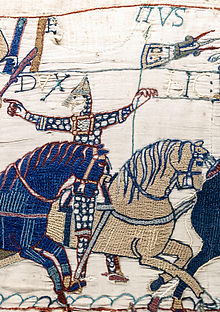Eustace II of Boulogne
| Eustace II, Count of Boulogne | |
|---|---|

Detail from the Bayeux Tapestry, possible depiction of Eustace II, with moustaches, inscribed in margin above in Latin: E...TIUS, possibly Latinised form of his name
|
|
| Spouse(s) |
Goda of England Ida of Lorraine |
| Noble family | House of Flanders |
| Father | Eustace I of Boulogne |
| Mother | Matilda of Leuven |
| Born | c. 1015 |
| Died | c. 1087 (aged 72) |
Eustace II, (c. 1015 – c. 1087), also known as Eustace aux Gernons (with moustaches) was Count of Boulogne from 1049–1087. He fought on the Norman side at the Battle of Hastings, and afterwards received large grants of land forming an honour in England. He is one of the few proven companions of William the Conqueror. It has been suggested that Eustace was the patron of the Bayeux Tapestry.
He was the son of Eustace I of Boulogne.
In 1048 Eustace joined his father-in-law's rebellion against the Emperor Henry III. The next year Eustace was excommunicated by Pope Leo IX for marrying within the prohibited degree of kinship. Eustace and Ida were both descended from Louis II of France, and just within the prohibited seventh degree. However, since today not all their ancestors are known, there may have existed a closer relationship. The Pope's action was possibly at the behest of Henry III. The rebellion failed, and in 1049 Eustace and Godfrey submitted to Henry III.
Eustace visited England in 1051, and was received with honour at the court of Edward the Confessor. Edward and Eustace were former brothers-in-law and remained political allies. On the other side of the political divide the dominant figure in England was Earl Godwin, who had recently married his son Tostig to the daughter of Eustace's rival the Count of Flanders. Furthermore, Godwin's son Sweyn Godwinson had been feuding with Eustace's stepson Ralph the Timid.
A brawl in which Eustace and his servants became involved with the citizens of Dover led to a serious quarrel between the king and Godwin. The latter, to whose jurisdiction the men of Dover were subject, refused to punish them. His lack of respect to those in authority became the excuse for his being outlawed together with his family. They left England, but returned the next year in 1052 with a large army, aided by the Flemish.
...
Wikipedia
